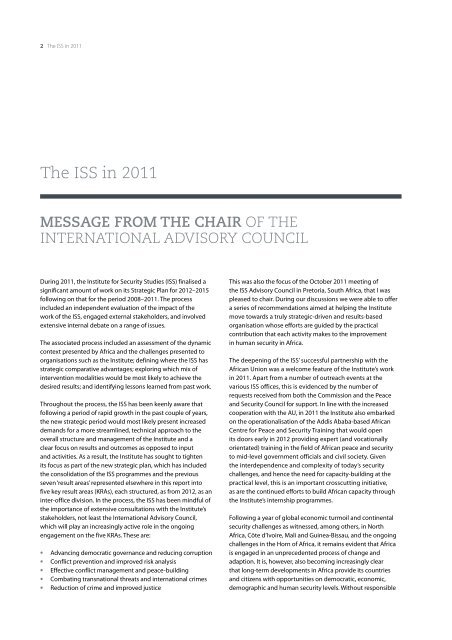programmes - Institute for Security Studies
programmes - Institute for Security Studies
programmes - Institute for Security Studies
You also want an ePaper? Increase the reach of your titles
YUMPU automatically turns print PDFs into web optimized ePapers that Google loves.
2 The ISS in 2011<br />
The ISS in 2011<br />
MESSAGE FROM THE CHAIR OF THE<br />
INTERNATIONAL ADVISORY COUNCIL<br />
During 2011, the <strong>Institute</strong> <strong>for</strong> <strong>Security</strong> <strong>Studies</strong> (ISS) finalised a<br />
significant amount of work on its Strategic Plan <strong>for</strong> 2012–2015<br />
following on that <strong>for</strong> the period 2008–2011. The process<br />
included an independent evaluation of the impact of the<br />
work of the ISS, engaged external stakeholders, and involved<br />
extensive internal debate on a range of issues.<br />
The associated process included an assessment of the dynamic<br />
context presented by Africa and the challenges presented to<br />
organisations such as the <strong>Institute</strong>; defining where the ISS has<br />
strategic comparative advantages; exploring which mix of<br />
intervention modalities would be most likely to achieve the<br />
desired results; and identifying lessons learned from past work.<br />
Throughout the process, the ISS has been keenly aware that<br />
following a period of rapid growth in the past couple of years,<br />
the new strategic period would most likely present increased<br />
demands <strong>for</strong> a more streamlined, technical approach to the<br />
overall structure and management of the <strong>Institute</strong> and a<br />
clear focus on results and outcomes as opposed to input<br />
and activities. As a result, the <strong>Institute</strong> has sought to tighten<br />
its focus as part of the new strategic plan, which has included<br />
the consolidation of the ISS <strong>programmes</strong> and the previous<br />
seven ‘result areas’ represented elsewhere in this report into<br />
five key result areas (KRAs), each structured, as from 2012, as an<br />
inter-office division. In the process, the ISS has been mindful of<br />
the importance of extensive consultations with the <strong>Institute</strong>’s<br />
stakeholders, not least the International Advisory Council,<br />
which will play an increasingly active role in the ongoing<br />
engagement on the five KRAs. These are:<br />
<br />
<br />
<br />
<br />
<br />
Advancing democratic governance and reducing corruption<br />
Conflict prevention and improved risk analysis<br />
Effective conflict management and peace-building<br />
Combating transnational threats and international crimes<br />
Reduction of crime and improved justice<br />
This was also the focus of the October 2011 meeting of<br />
the ISS Advisory Council in Pretoria, South Africa, that I was<br />
pleased to chair. During our discussions we were able to offer<br />
a series of recommendations aimed at helping the <strong>Institute</strong><br />
move towards a truly strategic-driven and results-based<br />
organisation whose ef<strong>for</strong>ts are guided by the practical<br />
contribution that each activity makes to the improvement<br />
in human security in Africa.<br />
The deepening of the ISS’ successful partnership with the<br />
African Union was a welcome feature of the <strong>Institute</strong>’s work<br />
in 2011. Apart from a number of outreach events at the<br />
various ISS offices, this is evidenced by the number of<br />
requests received from both the Commission and the Peace<br />
and <strong>Security</strong> Council <strong>for</strong> support. In line with the increased<br />
cooperation with the AU, in 2011 the <strong>Institute</strong> also embarked<br />
on the operationalisation of the Addis Ababa-based African<br />
Centre <strong>for</strong> Peace and <strong>Security</strong> Training that would open<br />
its doors early in 2012 providing expert (and vocationally<br />
orientated) training in the field of African peace and security<br />
to mid-level government officials and civil society. Given<br />
the interdependence and complexity of today’s security<br />
challenges, and hence the need <strong>for</strong> capacity-building at the<br />
practical level, this is an important crosscutting initiative,<br />
as are the continued ef<strong>for</strong>ts to build African capacity through<br />
the <strong>Institute</strong>’s internship <strong>programmes</strong>.<br />
Following a year of global economic turmoil and continental<br />
security challenges as witnessed, among others, in North<br />
Africa, Côte d’Ivoire, Mali and Guinea-Bissau, and the ongoing<br />
challenges in the Horn of Africa, it remains evident that Africa<br />
is engaged in an unprecedented process of change and<br />
adaption. It is, however, also becoming increasingly clear<br />
that long-term developments in Africa provide its countries<br />
and citizens with opportunities on democratic, economic,<br />
demographic and human security levels. Without responsible

















